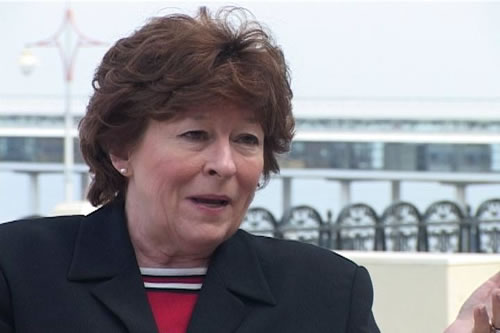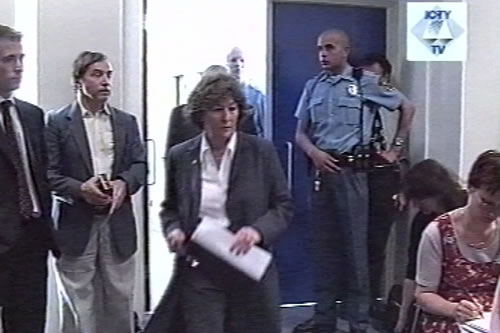Home
LOUISE ARBOUR: "I WAS NEVER TOTALLY PERSUADED THAT NATO INTENDED TO ARREST KARADZIC AND MLADIC”
Interview: Louise Arbour
In an exclusive interview for SENSE, the former Chief Prosecutor of the Tribunal in The Hague and newly-appointed UN High Commissioner for Human Rights says that she was never totally persuaded about NATO's intentions to arrest Karadzic and Mladic. Secret contacts with emissaries who inquired on behalf of the accused about possible advantages in case of a voluntary surrender. The indictments will be there forever, regardless of the Tribunal's "expiry date."
 Louise Arbour, Chief Prosecutor of the Tribunal
Louise Arbour, Chief Prosecutor of the Tribunal Although in her three years as Chief Prosecutor of the Tribunal in The Hague she was involved in the consideration of operational plans for the arrest of Radovan Karadzic and Ratko Mladic, Louise Arbour was "never totally persuaded that this exercise was going to yield anything." Moreover, she "was never totally persuaded that it was meant to yield anything.” Despite frequent announcements made by Western politicians and generals to the effect that "Karadzic and Mladic will be in The Hague by the end of he year," Arbour says that while she was in office, she "was never an optimist." She adds, "If it had happened, it would have been, from my point of view, a very pleasant surprise."
Louise Arbour was the Chief Prosecutor of the Hague Tribunal from September 1996 until September 1999, when she returned to Canada after having been appointed to the Supreme Court. This summer, Louise Arbour will again head for Europe, this time to Geneva, where she will take over as the UN High Commissioner for Human Rights. Until that time, she does not want to discuss the new professional challenges ahead of her, but she agrees to talk about the greatest piece of the Tribunal’s "unfinished business" and her term in office.
The fact that Karadzic and Mladic have been eluding justice for almost nine years, in Arbour's view, is "worse than when the accused die before their arrest or verdict," as has been the case with Zeljko Raznatovic Arkan, Simo Drljaca and Slavko Dokmanovic.
“You don’t have the same sense of unfinished business when it is fate that prevents accountability to follow its course. In these two cases it really is an affront to the victims, to the entire process, to the immense expenditure, not just in money but [in] efforts by the international community to acknowledge, to tell the full story."
In Arbour's opinion, it is not enough that the "tale" of Karadzic and Mladic has been told to a large extent at the trials of others--perpetrators charged with the same crimes: the shelling of Sarajevo, genocide in Srebrenica, rapes in Foca, murders in Brcko and Visegrad, the ethnic cleansing of the Bosnian Krajina, and abuse in the camps in Prijedor and elsewhere.
“This [Tribunal] is not a story-telling business. It’s an accountability business. The finger has to be pointed at them personally in a courtroom with an opportunity to defend themselves, which of course they could always say, or their supporters could always say, they didn’t have in the trials where others were implicating them. So this will never be enough until they actually stand trial.”
Arbour claims that while she was in office, she did all she could to have them arrested. There were, she says, "many signals, a lot of talk, many promises…," but the plans "never looked real" to her. She thinks that the risks and difficulties were overestimated. Sometimes it seemed to her that she was moving in a “vicious circle."
“If I had conversations with people on the more operational side, sort of NATO people on the ground, I was always told the same story: we take orders from our political masters; if we are given the task we will execute it. When I would go the political side I was always told the same thing: we task our people on the ground on the basis of the information they provide us about what is feasible. Who am I supposed to talk to?!"
Arbour confirms that during her term in office, she had contacts with several "emissaries" who offered "proof of innocence" on behalf of the accused, particularly of Radovan Karadzic, and inquired about the possible advantages they might count on in case they voluntarily surrendered. For the time being, however, she refuses to disclose any details about those contacts.
If Karadzic and Mladic were to "survive" the Tribunal and remain at large after its mandate is completed – which is planned for 2010 – Arbour is convinced that their indictments will "remain there forever, as valid and binding international legal instruments." Documents pertaining to the completion of the Tribunal's mandate should, in Arbour's opinion, contain provisions about the "re-constitution of the Tribunal" if Karadzic, Mladic and other senior indictees who have not yet faced trial are arrested.
As the UN High Commissioner for Human Rights, Louise Arbour will definitely be in a position to influence such an outcome.
"I hope so. I am very interested in this entire exercise in which I invested a lot of my professional life. But it seems to me that it is virtually self-evident that you cannot let people wait you out. It’s such an absurd concept of justice, particularly now where we are situated generally in international criminal justice, to suggest that people can just hide long enough that we give up. It is totally unacceptable."
Photos

